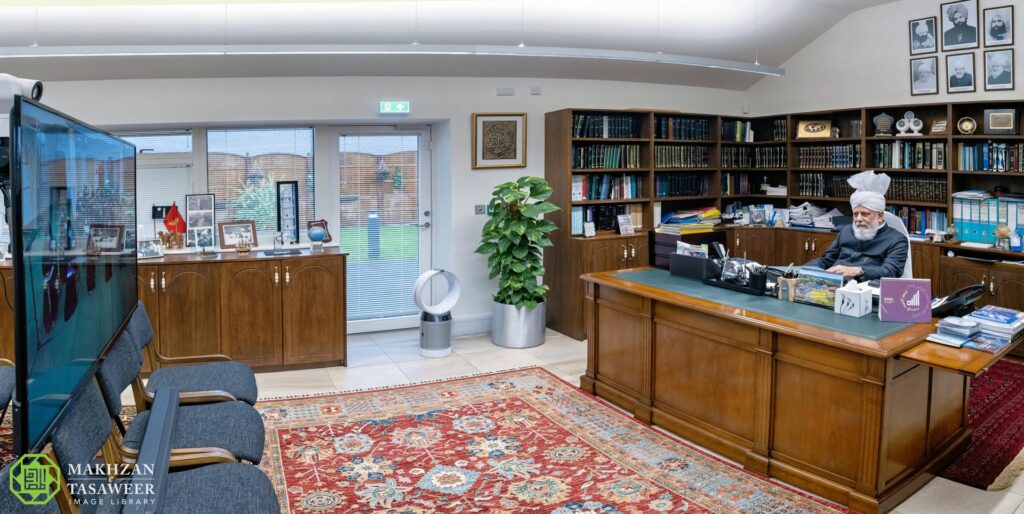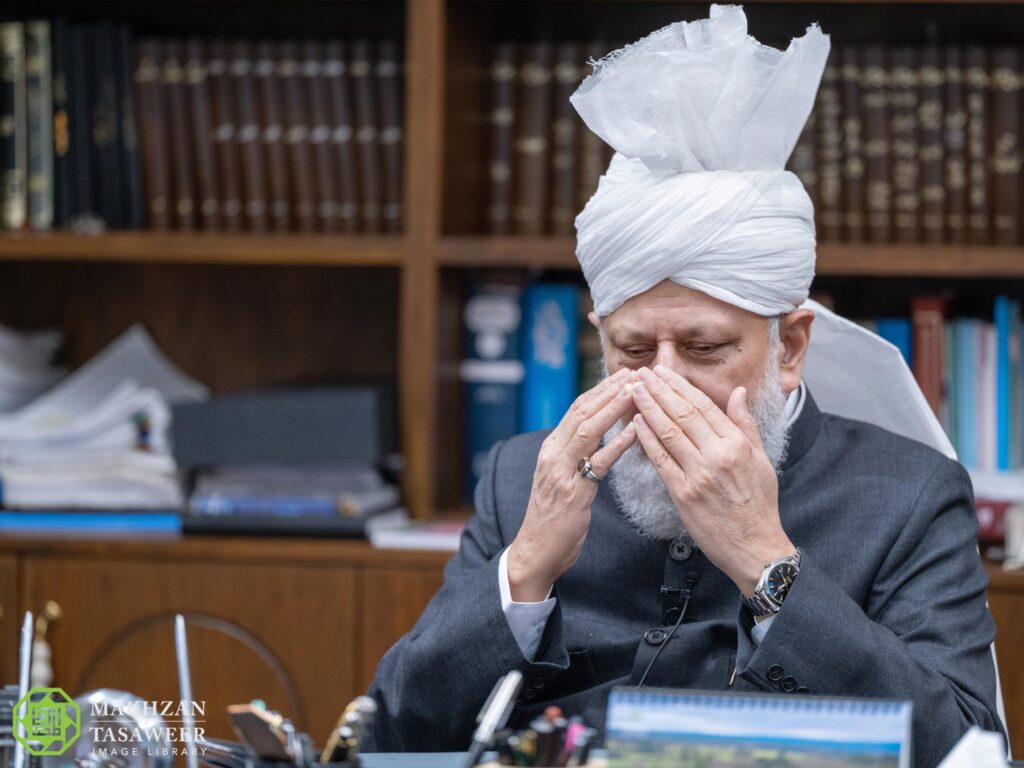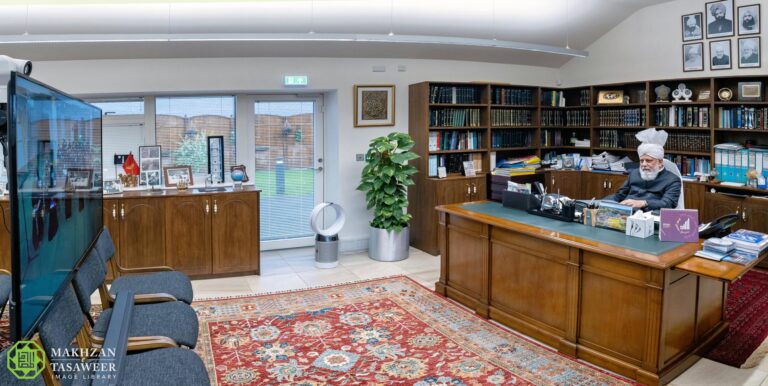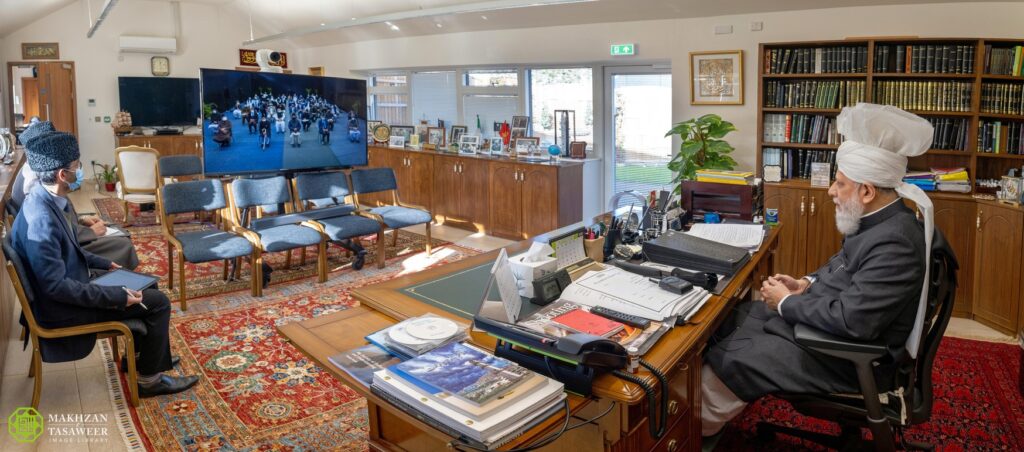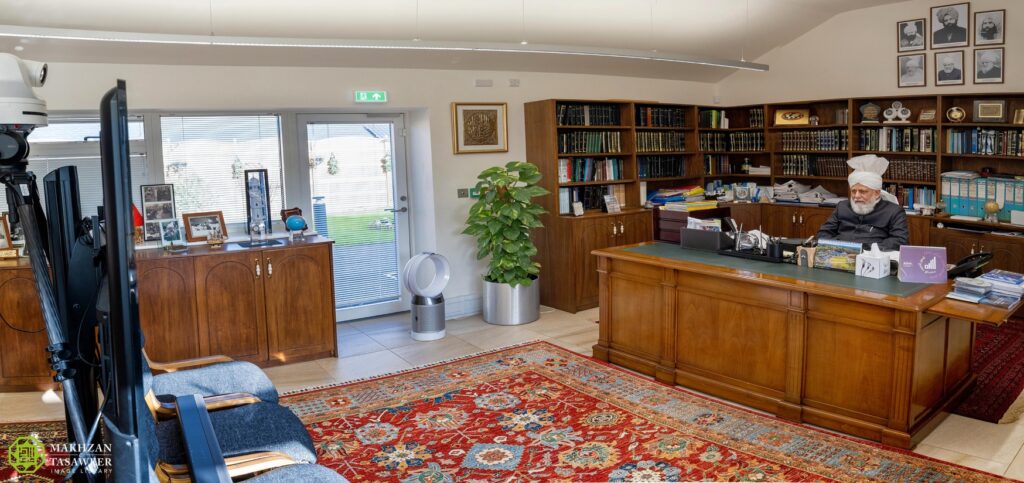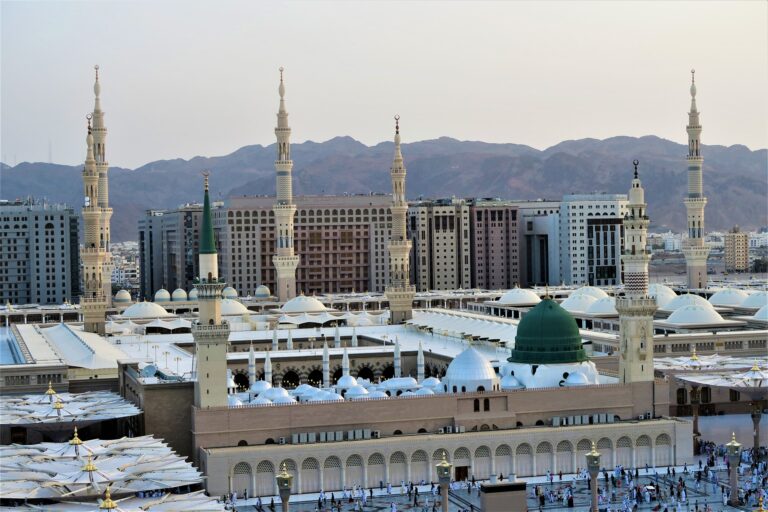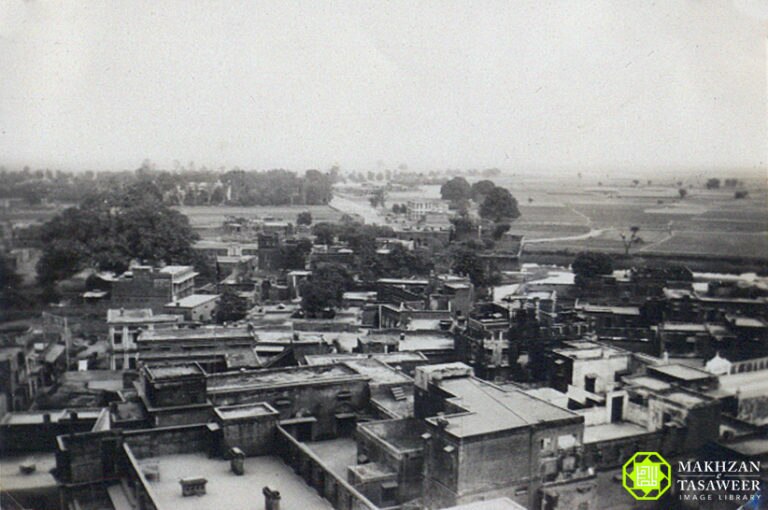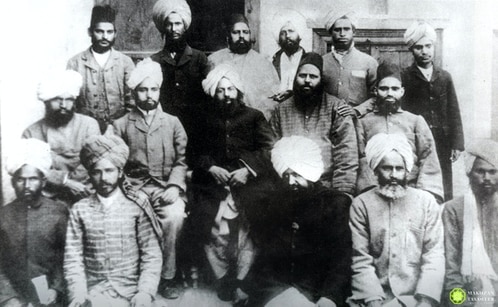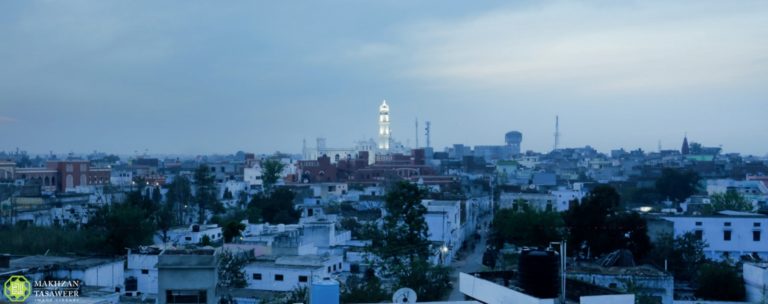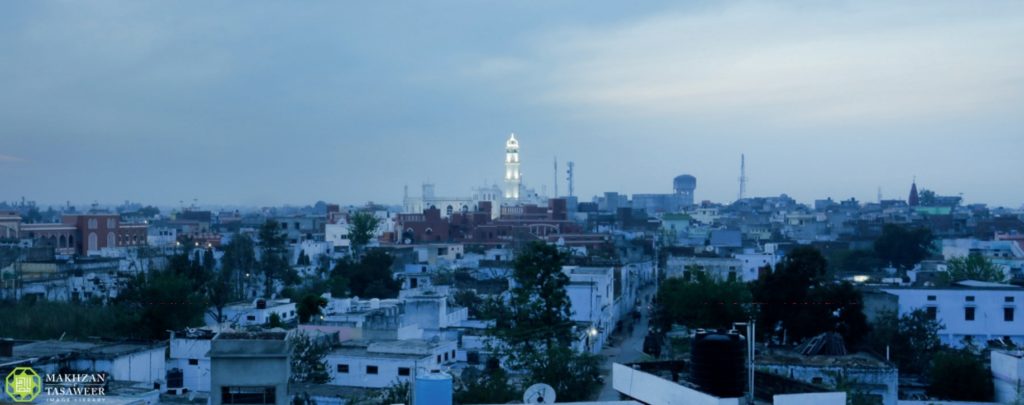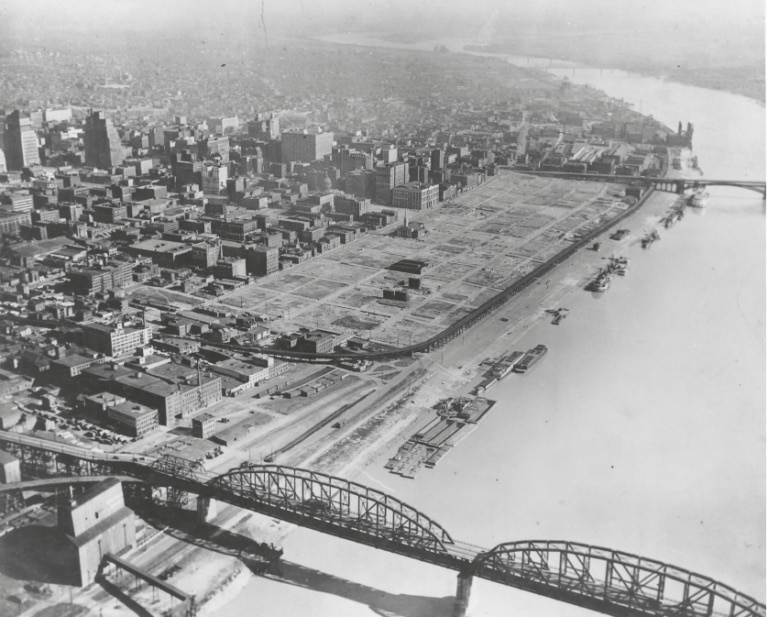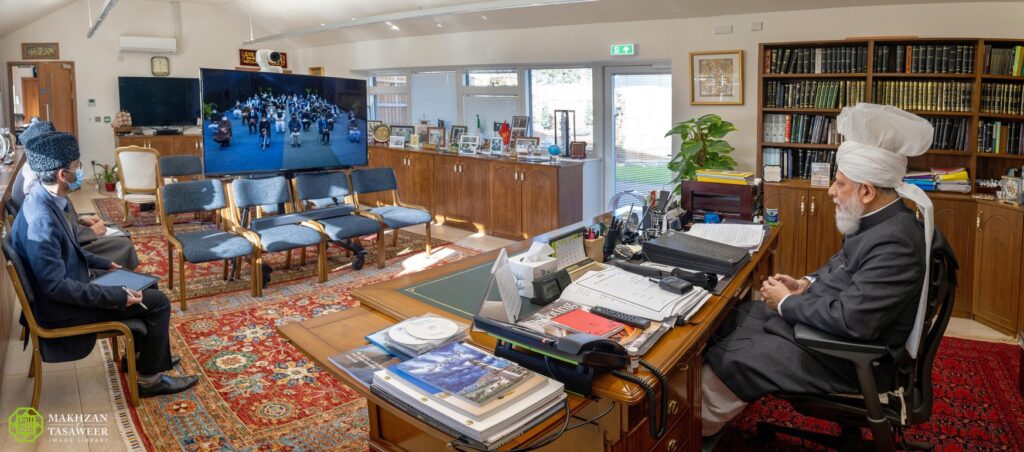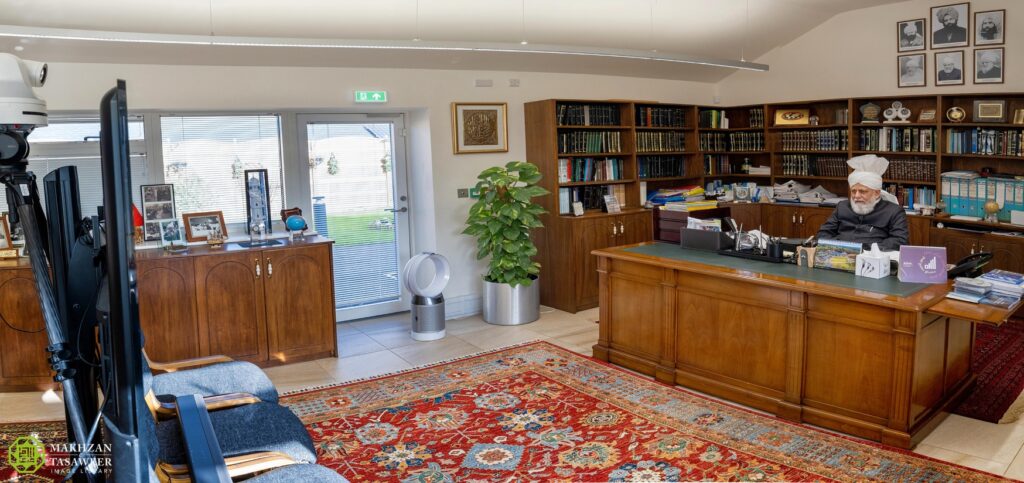Ataul Mujeeb Rashed, Imam Fazl Mosque London
Every aspect of the character of the Prophet, peace and blessings of Allah be upon him, is extremely beautiful and fascinating. From whichever point of view you look at it, our master, Hazrat Muhammadsa was unique and matchless as an excellent model.
In this article, I will be writing about his love and kindness for his Companions, may Allah be pleased with them all. The character of the Holy Prophetsa has the distinction that the Creator of this universe has recorded the sublime nature of this holy personage in His holy scripture and secured it forever. In the Holy Quran, Allah says:
اِنَّکَ لَعَلٰی خُلُقٍ عَظِیْمٍ
Thus, Allah, the Lord of the Throne, declares that His beloved Messenger, Muhammad Mustafasa, reached the peak of noble qualities. The grand character of Muhammadsa is the masterpiece compendium of all-comprising and unmatched qualities in every respect. Two verses that refer to his love and kindness for his Companionsra are particularly worth consideration:
Allah testified on one occasion:
فَبِمَا رَحۡمَۃٍ مِّنَ اللّٰہِ لِنۡتَ لَہُمۡ ۚ وَ لَوۡ کُنۡتَ فَظًّا غَلِیۡظَ الۡقَلۡبِ لَانۡفَضُّوۡا مِنۡ حَوۡلِکَ
“And it is by the [great] mercy of Allah that thou art kind towards them, and if thou hadst been rough [and] hard-hearted, they would surely have dispersed from around thee.” (Surah Al-e-Imran, Ch.3: V. 160)
The great mercy of Allah made His beloved an embodiment of mercy. Otherwise they (the Companionsra) would not have gathered around the Prophetsa with ardent love.
لَقَدۡ جَآءَکُمۡ رَسُوۡلٌ مِّنۡ اَنۡفُسِکُمۡ عَزِیۡزٌ عَلَیۡہِ مَا عَنِتُّمۡ حَرِیۡصٌ عَلَیۡکُمۡ بِالۡمُؤۡمِنِیۡنَ رَءُوۡفٌ رَّحِیۡمٌ
“Surely, a Messenger has come unto you from among yourselves; grievous to him is that you should fall into trouble; [he is] ardently desirous of your [welfare]; [and] to the believers [he is] compassionate, merciful.” (Surah al-Taubah, Ch.9: V. 128)
We see such faith-inspiring scenes everywhere throughout the blessed life of the Holy Prophetsa, in keeping with the Divine testimony. The blessed person, who was rahmatun lilalamin – a mercy for mankind – was the embodiment of mercy for all the worlds and creatures. His love and kindness for his followers and self-sacrificing Companionsra had different dimensions altogether. The clouds laden with his love and mercy showered all the time, everywhere and on everyone to such an extent that everyone was fully saturated and no one was left deprived of that beneficence. The children benefitted from it and the elders too. The ladies partook in it and so did the men. The freemen as well as the slaves received it. The poor were enriched with this kindness and so were the rich.
This expression of love and kindness continued day and night. Their beneficent master was kind to them during poverty and during prosperity too. In short, love and kindness of the Holy Prophetsa continued to rain heavily on every section of Companionsra, all the time.
How fortunate were the holy ones who received the affection of the “mercy for all people” and how lucky were the faithful who kept circling around this eternal light of love!
The Promised Messiahas, the illustrious spiritual son of the Holy Prophetsa, was the product and sweet fruit of the everlasting love of the Holy Prophetsa. This truly ardent lover has described the love and kindness of his master, Muhammad Mustafasa, in a fascinating manner.
آں ترحم ہاکہ خلق از وے بدید
کس ندیدہ در جہاں از مادرے
Meaning that the love and kindness with which our master, Hazrat Muhammad Mustafasa treated people was so great and magnificent that not even a mother would have treated her children like it.
One may wonder if anyone can be more affectionate than a mother. A mother is cited as the model of love. Can there be anyone more affectionate than her? Yes, indeed! We see the most glaring example of that in the blessed person of our master, Hazrat Muhammad Mustafasa.
Hazrat Zaidra came to the Holy Prophetsa at a tender age. He had the honour of being the first of the slaves to accept Islam. He came as a slave and the Chief of the Creation freed him and adopted him as his son. Because of his love and extreme affection, Hazrat Zaidra forgot the love of his real parents. When Zaid’s parents and relatives came to take him away, the Holy Prophetsa readily allowed him to go, but Zaidra refused to leave. Notwithstanding his parents’ insistence, he was not prepared to go with them. He had become so attached to the Holy Prophetsa on account of the love and kindness by the beloved of God that he preferred his companionship over the love of his own biological parents.
Once, a lady came to the Prophetsa with her sick child. The sickness of the child was so severe and had persisted so long, the heartbroken, she said that she could no longer bear the sight of his suffering and requested for prayer that he passes away and God brings an end to his suffering and her trials.
Mark the love and kindness of our beloved master! He replied, “Should I not pray that your child recovers, grows up to adulthood, takes part in Jihad and achieves martyrdom?”
That is exactly what transpired. The child recovered, grew up to be a devout Muslim and was martyred in the battlefield. Truly his love exceeded the love of every mother. The mother, despite her deep love, was so distressed because of the child’s sickness that she begged for his death.
However, our master, being more affectionate than a mother, said, “No, I pray that he survives and inherits eternal life through martyrdom.”
Talking of good treatment to children, Hazrat Anasra says, “I have never seen a man who was more compassionate to children than Allah’s Messengersa.” Whenever he passed by children, he would himself greet them with salam, put his hands on their heads with love and lift them up with love. Whenever he received any fruit, he would give it to the youngest child first. It was the charm of such love that made the children drawn to the Holy Prophetsa like iron is attracted to magnet.
It is narrated that when this kind benefactor of children walked around the streets or was about to embark on a journey or was returning from one, the children playing in a dusty area would cling to his legs out of love, they would hold his finger and walk along with him in a relaxed informal way. The Holy Prophetsa would talk to each one of them affectionately and see them off with prayers. Hazrat Alira, who had the honour of being the first child to accept Islam, described the scenario of that love in the following words:
“I used to follow Allah’s Messengersa like the baby camel follows its mother and does not part with her.”
This conduct of the children, their attraction and extreme love was the natural outcome of the affection that was expressed day and night.
When our perfect guide, Muhammadsa migrated and entered Medina, young girls of the Ansar, dressed in beautiful attire, came out of their homes and welcomed him with songs, he was overcome with love and asked them, “Do you love me?” All replied unanimously, “Yes, O Messenger of Allah’”. The Holy Prophetsa said, “I love you too”.
How fortunate were those girls to have gained the love of the most beloved of God! Just as he joined the young ones in their joyous moments, he also shared their feelings of pain and sorrow.
Once, in a street of Mecca, he saw a young orphaned child crying. Others might have passed by unconcerned, but not the Holy Prophetsa – he approached him and picked him up. The child was extremely poor. He did not have clothes to cover his body nor shoes to wear. His feet were bruised. This pitiable condition made the eyes of the Holy Prophetsa well up with tears. He carried him to his house. The child had not eaten food for several days and so the Holy Prophetsa fed him, dressed him up with new clothes and kept him in his house like his own children and finally sent him to his relatives.
In the context of love and kindness of Holy Prophetsa for his Companionsra, his treatment of his servants is particularly worth mentioning. Generally, servants are regarded as worthless slaves. Their self-respect is crushed, and they are subjected to all sorts of maltreatment. However, the behaviour of the Benefactorsa of Mankind was totally different.
Hazrat Anasra had the good fortune of serving the Holy Prophetsa for 10 years. Apparently, he was a servant, but the Holy Prophetsa treated him so decently that Anasra said, “I served the Prophetsa, for 10 years. By Allah, he never even said to me, ‘Uff!’ [a minor harsh word denoting impatience]. He never said to me, ‘Why did you do that?’ or ‘Why did you not do that?’ If I did anything improperly, he would never scold me, rather he would console me and instruct me affectionately and was never harsh to me. He would frequently join me in doing many tasks.” Hazrat Anasra states, “Several times, it so happened that the Holy Prophetsa sent me on an errand; however, being a child, on the way, I would join other children playing and forget all about the task and would not return for quite a while. The Holy Prophetsa would then come himself and instead of scolding me, he would sneak in from behind and hold my ear or head. I would say, ‘I will go now’. Affectionately, he would let me go. Then I would proceed to do the task.”
What magnanimity! What affection! What forgiveness! Can anyone show the likes of it anywhere today?
Hazrat Aishara summarises the essence of her observation in the following words:
وَاللہ مَا ضَرَبَ رَسُولُ اللہ خَادِماً
“By Allah, the Holy Prophetsa never hit any servant.”
Love and kindness of Allah’s Messengersa for his Companionsra manifested itself in wonderful ways. It is one thing to treat someone nicely and show love; however, giving preference to the needs and comfort of his Companionsra over his own is quite another. We observe such inspirational display in the character of Muhammadsa. We see in his person the pinnacle of attributes mentioned in the Quran:
یُؤۡثِرُوۡنَ عَلٰۤی اَنۡفُسِہِمۡ وَ لَوۡ کَانَ بِہِمۡ خَصَاصَۃٌ
Meaning, they prefer others to themselves even “though poverty be their own lot.” (Surah al-Hashr, Ch.59: V.10)
Once, a woman gifted the Prophetsa with a beautiful shawl. He needed it and accepted it with thanks. When he came out of his house wearing that shawl, one of the Companionsra said, “O Messengersa of Allah! How beautiful is that shawl!” The Prophetsa had a very perceptive mind. Considering the need of the companion, he gave him the shawl immediately. A companion got married. He had nothing for the walima. Allah’s Messengersa told him to go to Aishara and ask for a bucket of flour. He went there happily and fetched it. Little did he know that there was nothing for dinner in the Prophet’s house that evening other than that flour! I become tearful as I think of the loving kindness of Allah’s Messengersa for his Companionsra. He arranged for the walima of his dear companion. How he and his household spent that night, only God knows. This is not an isolated incident; it happened many times.
Once, a companion stayed with him as a guest. There was only goat’s milk for dinner that night, which he gave to the guest and spent the whole night himself without food. It is narrated in the ahadith that he did not have anything the night before as well.
Feeding the Companionsra and starving himself; there is only one such master, Muhammad Mustafasa. May my father and mother be sacrificed for him! During the blessed life of Allah’s Messengersa, we come across anecdotes of love, kindness, sympathy and consolation of the Companionsra at every step, each one better than the other.
Hazrat Abu Hurairahra relates that once, he had starved for several days. Out of desperation, he stood at the entrance of Masjid al-Nabawi and asked the Companionsra, who happened to pass by, the meaning of the Quranic verse that enjoins feeding the poor. That was a subtle way of asking for food, but nobody understood his intention. His condition deteriorated and he was about to fall with extreme weakness out of hunger, when suddenly he heard an affectionate melodious voice. When he looked around, it was prophet Muhammadsa. He told him, “… we too did not have anything to eat at home today. A person has just brought a bowl of milk. Go to the mosque and see. There may be other Muslims who are hungry like us. Call them all in.” Hazrat Abu Hurairahra gathered and brought them all in. The Holy Prophetsa started offering the milk bowl from the right hand side of the gathering. Everyone drank the milk to their fill. Then it was Abu Hurairah’s turn; he also had his fill. When all the self-sacrificing Companionsra, who had suffered from hunger and thirst, had filled their stomachs with milk, at last, it was the turn of our master, Muhammad Mustafasa.
If you go down the lane of imagination, this famous and well-known episode will lead you to varied vistas. In today’s world, one cannot even think of such love and affection. Firstly, no master or chief will ever experience such hunger. However, if it does happen, on getting the food, they will consider it their right to be the first to take it. However, we live in a strange world.
A starving master gets a bowl of milk and invites all his hungry and thirsty devotees. And without taking a sip himself, he offers it to each one of them. They all become satiated and saturated one by one as he watches them affectionately. Finally, when all the Companionsra are fully satiated and cheerfulness and smiles appear on their faces, the master gets the leftover, although his need was no less than that of the Companionsra in any way.
Another aspect of love and affection of the Holy Prophetsa for his Companionsra was that his heart was filled maximally with a passion of sympathy and love for them. He wished all the time that they did not suffer in any way. He prayed and made every possible effort for this. It is narrated in a hadith that whenever there was a dust-storm or clouds appeared in the sky, signs of anxiety would appear on the face of the Holy Prophetsa and he would pace up and down restlessly. When the rain was over, he would be at ease and composure would replace the worry.
Hazrat Aishara once asked him the reason for this. The Holy Prophetsa replied, “I fear lest there should be a calamity in it for my people like there was for the people of ‘Ad.”
Hazrat Anasra relates an incidence that took place during the Medinite period. Those were the days when there was danger of Muslims being attacked by the enemies any time. One night, suddenly there was an uproar and some noises were heard from afar. The Companionsra started gathering with the intention of going out to investigate. Lo and behold! They saw the Holy Prophetsa entering Medina on horseback. He reassured the Companionsra that there was nothing to worry about as he had already investigated the area from where the noise came from. While this incident bears testimony to the incomparable and astonishing courage of the Holy Prophetsa on the one hand, it is also a beautiful example of the love and affection that he had in his heart for his dear Companionsra. He sensed danger for his Companionsra being ambushed at night and ventured out, all alone, to assess the situation and did not bother any of the Companionsra to wake up. What a wonderful scenario! The Companionsra are gearing up to go out and assess the circumstances and their beneficent Master, who loved them more than their mothers, is reassuring them that there is nothing to worry about as he has already gone to check.
This bravery and courage springing out of the fountainhead of true love and sympathy is surely matchless. An extremely fascinating and endearing aspect of love and affection of the Prophetsa for his Companionsra was that though he was their master and leader, he joined them in every job and helped them on every occasion. The love and devotion of the Companionsra for him was such that they were always prepared to shed their blood instead of his sweat. Their delight was to make their beloved master relax while they displayed their devotion and affection. However, because of the love and affection that he had for the Companionsra, our beloved Master never liked to order them to do something and sit down quietly himself.
In his blessed life, we see countless examples of such greatness of character, springing from the fountainhead of love and affection.
During a journey, it was time for cooking food. A companion offered to take the responsibility of slaughtering a goat; the second one said he would remove its skin, the third one offered to do the cooking. The Holy Prophetsa said, “Okay, I take the responsibility of fetching some firewood from the jungle”. The Companionsra said most respectfully, “O our Master, may our parents be sacrificed for you! Don’t bother please; we will do that too.” The Prophetsa replied, “I know that you can do it. But I do not like to exalt myself above you.”
The Heavens witnessed the spiritually regenerative scene that the king of the two worlds went into the jungle, picked the firewood and carried it on his shoulder; that was used to cook food for everyone.
After the migration, during the building of the Masjid al-Nabawi, the Holy Prophetsa joined the Companionsra, shoulder to shoulder, in the construction work. We find details of this in ahadith. It is related by Hazrat Aishara that when construction started, the Holy Prophetsa also carried the bricks along with the Companionsra. He sang loudly couplets in chorus with the Companionsra to encourage them. His participation in the work was not just nominal; he was fully involved. According to one narration, when he lifted heavy stones, his body used to bend down. Out of great devotion and love, the Companionsra would request him repeatedly to leave it for them to carry the heavy stones. How endearing and beautiful was his reaction on such occasions! He knew very well that a refusal will break the hearts of his dear Companionsra. He would accede to their request and hand over to them the stone that he had lifted. However, he would continue the task as before and pick up another stone as heavy.
What a beautiful and lovely model our master was! Another spiritually exhilarating incident of a similar nature took place during the battle of the Confederates. After consultation with Hazrat Salman Farsira, it was decided to dig up a ditch around Medina for its security. 10-man teams were allocated 40 cubits each to dig. After assigning the job to the Companionsra, the Holy Prophetsa did not sit idly by. He participated in the task fully. Hazrat Barara relates that he was engaged in digging into the earth and shifting it around along with his companions. He mentioned adoringly:
I saw that the dust had covered his white belly. He was not wearing any shirt. One is enraptured by affability and endearment of the perfect model Muhammad Mustafasa. He joins his self-sacrificing Companionsra as a labourer because his heart is full of love and kindness for them. He did not regard himself to be superior to them in any way. However, God knows, that that indeed was the secret of his everlasting greatness and exaltation. That indeed was the miracle which raised him to the most venerable status of “Khatamun-Nabiyyin”.
Undoubtedly, he is the chief of those of former days and latter days. The world of love, affection and humanity of the Holy Prophetsa was a wonderful world. Everybody was drenched in the monsoon rain of his love. For those who were his devotees, this love and affection assumed the form of dense clouds that rained on them heavily, day and night.
One day, the Medinites witnessed an extremely beautiful scene of love. The Holy Prophetsa went to the market and saw a Bedouin companion, Zahirra toiling as a labourer. He was not of a pleasant facial appearance and the dust and sweat made him look ugly. The Holy Prophetsa saw his dear friend and heartfelt love for him surged up. He snuck behind him and placed his hands over his eyes. Zahirra was wonder-struck, wondering who could express this love to a poor, destitute and ugly person like him. Then he figured out that it could be none other than Muhammadsa. When he touched his hands, he was convinced. Zahirra took it as a Godsend and started rubbing his back that was covered with dust, on to the Prophet’s body. The Prophetsa smiled! Later, another chapter of love and affection opened. The Prophetsa said, as a joke, to those around him, “I am selling a slave, who would like to buy him?” Zahirra said, “O Master! Who will buy this poor and wretched man?”. The Prophetsa said, “No, no, don’t say that. Allah, the Lord of Throne, Himself is your buyer.”
What beauty and love there is in that incident! This feature is the miracle of the holy personage who was more affectionate and beneficent than a mother. A mother is mercy personified for children. A mother’s affection is multifarious; it is persistent and ongoing. Our Beloved master, Muhammad Mustafasa was more affectionate and beneficent than all mothers. For his Companionsra particularly, his love and affection were boundless and unfathomable. All his actions throughout his life reflected his unlimited affection. This aspect of his character manifests itself in wide-ranging styles, in the mirror of different events.
I present a selection of such anecdotes. Hazrat Ammar bin Yasirra, a devoted companion of the Holy Prophetsa, was subjected to severe torture by the enemies. Once, he came to the Holy Prophetsa in an extremely wearied condition and in anguish said, “O Messengersa of Allah, people are killing me. They put so much load on me that I am unable to carry.” Seeing his wretched condition and hearing his account, tears welled up the eyes of the Holy Prophetsa.
It is narrated by Hazrat Umm-e-Salamara; “I saw the Messengersa of Allah setting Ammar’s hair with his own blessed hands and telling the people, ‘Ammar is so dear to me as if he is the skin between my eyes and nose.’”
A poor lady in Medina used to do the cleaning of Masjid al-Nabawi. The Holy Prophetsa did not see her for a few days and enquired about her. He was told that she had died and had been buried. He asked why he was not informed and added that he would have participated in her funeral prayer. He enquired about the location of her grave, went there and prayed for her. Hazrat Fatimahra bint Asad, the mother of Hazrat Alira, had raised the Holy Prophetsa in her house. He loved her a great deal. When she died, the Prophet’s eyes became tearful with sorrow. To bury her, he himself went down the hollow where she was to be buried and addressing her in a mournful voice, said, “You were indeed the best mother. May Allah the Exalted reward you accordingly for being the best mother.”
When persecution against the Holy Prophetsa and his devoted Companionsra by the Meccans increased a great deal, the Holy Prophetsa could not bear the sight of their suffering. When he heard about their suffering, he would become tearful with upsurge of emotions of love for them, would give them glad tidings of Paradise and pray for them. When the situation deteriorated exceedingly, the kind and affectionate master permitted his Companionsra to emigrate to Ethiopia, where they would be in peace. He himself stayed back in Mecca.
The king of Ethiopia treated the Muslim migrants very kindly and the Holy Prophetsa appreciated this kindness so much that after a few years, when a delegate came from Ethiopia, he took it upon himself to serve them. The Companionsra offered to serve them on his behalf repeatedly but he replied, “I want to serve them myself because when my dear companions, who had suffered persecution, went to that country, these people treated them very respectfully.” When Hazrat Ruqiyyara, the daughter of the Holy Prophetsa passed away, her husband, Hazrat Uthmanra appeared grieved. The fact that he was no longer the son-in-law of the Holy Prophetsa bore heavily on his heart. The Holy Prophetsa realised that and got her second daughter Hazrat Umm-e-Kalthumra married to him. As decreed by God, she also died soon afterwards. With great love and affection, the Holy Prophetsa said, “O Uthman! If I had a third daughter, I would have got her married to you too.”
Hazrat Khababra bin Arat, one of his devoted companions, who had suffered a great deal in the way of Allah, was very dear to the Holy Prophetsa. Once, he sent him away for Jihad. There was no man in Khabab’s household and the women did not know how to milk cows. So the Holy Prophetsa used to go to his house to milk the cows. On the epoch-making occasion of the conquest of Mecca, countless aspects of the multifaceted character of our Master, Muhammad Mustafasa manifested magnificently. That was a day of victory, a day of taking revenge from the enemies in a handsome way, a day of humility, a day of expressing gratitude to Allah. At the same time, it was a day for display of love and affection for the self-sacrificing Companionsra.
How well did our beneficent master display all that and what a wonderful and endearing style did he adopt! He declared, “O enemies of Islam! The negro slave whom you subjected to all sorts of torture and oppression for a long time and yet failed to silence his exclamations of ‘ahad, ahad’; Hear! Whoever stands under the standard of that very Bilal will have peace.”
I wonder what went through the mind of Bilalra on hearing that announcement and observing the love and affection of the Holy Prophetsa. The Holy Prophetsa slaughtered a sacrificial lamb on Eid day. After having fulfilled that obligation, he specially slaughtered another one and prayed, “O Allah! Accept this on behalf of those members of my ummah who cannot afford it.”
This show of love and affection for the poor members of the ummah is undoubtedly a characteristic of the Holy Prophetsa, who certainly was more loving and generous than parents. The miracles of his love and affection were not restricted to his lifetime. Its beneficence is ongoing even after his demise.
It is narrated in a hadith that on the Day of Judgement, on seeing the angels of hell dragging some people away, our Master will say:
اصیحابی! اصیحابی!
“My companions! My Companions!”
The recreants will suffer the consequences of their deeds. However, the spontaneous expression by the Holy Prophetsa reflects his love and affection. Moreover, when he will be permitted to intercede, his love and affection will assume the form of entreaty:
یَا رَبِّ امتی! یا رَبِّ امتی
“O my Lord! Have mercy on my ummah!”
A few anecdotes of love and affection of the Holy Prophetsa for his Companionsra have been presented to you. The fact is that this chapter is so vast that it is impossible to comprehend it and elaborate it entirely. It is an endless ocean. It is a fountainhead of mercy and grace whose beneficence is constant, ongoing, and progressive.
May Allah grant us the ability to do good deeds that were dear to our master so that on the Day of Resurrection, he may cast his loving glances on us. Amin!
